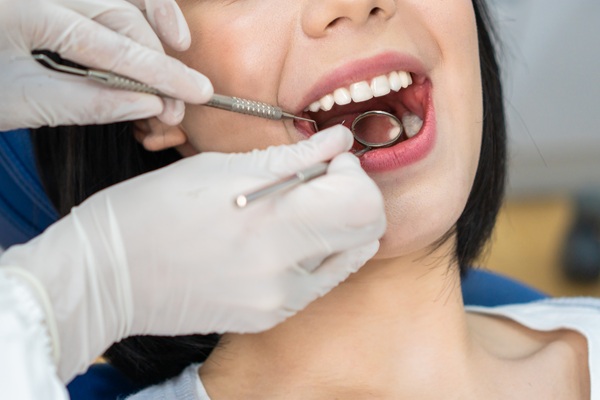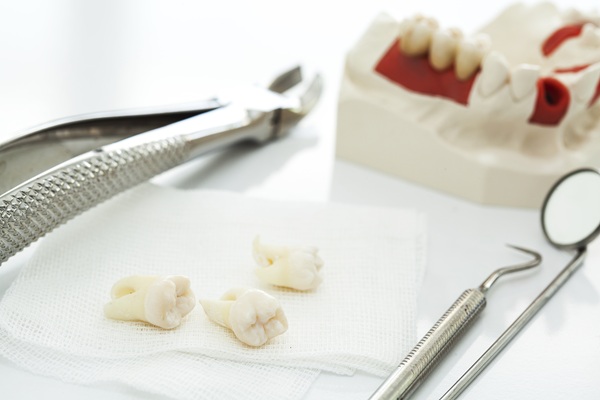 When individuals experience gum problems of any kind, it is imperative that they visit a family dentist for a thorough cleaning and possibly treatment. Gum concerns, even mild ones, are likely indicative of gum disease, the number-one cause of tooth loss in adults. Unfortunately, it often goes unnoticed in the early stages, and by the time an individual becomes concerned, the disease has already progressed. The good news is that immediate action may help to stop the spread and possibly reverse any damage.
When individuals experience gum problems of any kind, it is imperative that they visit a family dentist for a thorough cleaning and possibly treatment. Gum concerns, even mild ones, are likely indicative of gum disease, the number-one cause of tooth loss in adults. Unfortunately, it often goes unnoticed in the early stages, and by the time an individual becomes concerned, the disease has already progressed. The good news is that immediate action may help to stop the spread and possibly reverse any damage.
Gum concerns patients should not ignore
Early detection is key to managing gum disease before it progresses to a more serious form of the condition, such as gingivitis, periodontitis, or advanced periodontitis. Though painless in the early days, these are a few common signs that should spark concern:
- Tenderness, swelling, or puffiness in the gums
- Discoloration, such as red or purplish gums
- Bleeding, or a pink tinge on the toothbrush after brushing
- Receding gums
- Bad breath
- Pain when chewing
- Pus between the gums and teeth
- Loose or lost teeth
Any of these symptoms, even if they come and go, are possibly indicative of gum disease and should prompt an immediate visit to a family dentist.
Treatments for early gum concerns
If the only symptoms present include tenderness, swelling or puffiness, bleeding when brushing, and/or discoloration, a thorough dental cleaning may be all the patient needs to restore gum and oral health. Deep cleaning procedures that may help include scaling and root planing. Scaling is the process of removing any plaque and tartar buildup that lies beneath the gum line. Root planing entails smoothing the tooth root to help it reattach to the tooth. Both procedures are nonsurgical, noninvasive ways to treat the early stages of gum disease.
Lifestyle changes to prevent a reoccurrence
A family dentist is likely to recommend several lifestyle changes for the patient to stop gum disease from developing. Those may include changing the diet to promote tooth and gum health, avoiding smoking cigarettes and drinking alcoholic or sugary beverages, managing diabetes and other health conditions, and practicing good oral hygiene.
In particular, practicing good oral hygiene is one of the most effective ways one can prevent gum disease or a reoccurrence of it. A strong oral hygiene routine should entail brushing the teeth twice daily for two minutes at a time with a fluoridated toothpaste, flossing at least once a day and before brushing, and rinsing with an antibacterial mouthwash. The American Dental Association also recommends that individuals rinse their toothbrushes thoroughly after use and store them in an upright container.
In addition to practicing good oral hygiene at home, individuals should maintain regular visits with a family dentist. Ideally, visits should take place every six months, though a dentist may recommend more frequent visits if a patient has a particularly high risk for a reoccurrence of gum disease.
Conclusion
Gum problems are not issues to ignore. If any symptoms begin to arise, contact a local family dentist right away.
Request an appointment or call Cosmetic & Family Dentistry of the North Shore at 781-443-8268 for an appointment in our Swampscott office.
Recent Posts
Wondering about what a family dentist does? Read on to learn more. Family dentists look after the whole family so you need not visit more than one office to get dental care for everyone. Selecting a family dentist can help save money and time, and develop a relationship with your dentist so that visiting the…
Are you looking for a family dentist? Read on to learn what questions you should ask before selecting a family dentist. A consultation visit with a family dentist offers a way to learn more about the dental practice you are considering and see if they and their dental team are a good fit for what…
Oral cancer occurs inside the mouth and is so often called mouth cancer or oral cavity cancer, and a family dentist will usually check for this disease during routine dental visits. However, if you are experiencing abnormal mouth pain, lumps, or lesions before your next exam, it may be a good idea to schedule an…


